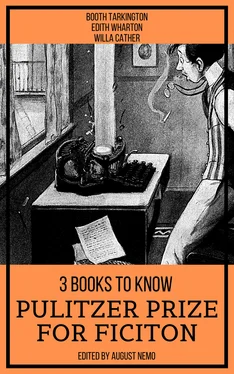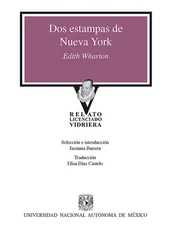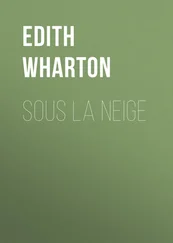George seemed to find himself at a loss. “Why shouldn't—Well, he shouldn't, because a man has a right to certain explanations.”
“What explanations?”
“Whether he's been made a toy of!” George almost shouted. “That's what I want to know!”
Lucy shook her head despairingly. “You are the queerest person! You say you're a man now, but you talk more like a boy than ever. What does make you so excited?”
“'Excited!'” he stormed. “Do you dare to stand there and call me 'excited'? I tell you, I never have been more calm or calmer in my life! I don't know that a person needs to be called 'excited' because he demands explanations that are his simple due!”
“What in the world do you want me to explain?”
“Your conduct with Fred Kinney!” George shouted.
Lucy uttered a sudden cry of laughter; she was delighted. “It's been awful!” she said. “I don't know that I ever heard of worse misbehaviour! Papa and I have been twice to dinner with his family, and I've been three times to church with Fred—and once to the circus! I don't know when they'll be here to arrest me!”
“Stop that!” George commanded fiercely. “I want to know just one thing, and I mean to know it, too!”
“Whether I enjoyed the circus?”
“I want to know if you're engaged to him!”
“No!” she cried and lifting her face close to his for the shortest instant possible, she gave him a look half merry, half defiant, but all fond. It was an adorable look.
“Lucy!” he said huskily.
But she turned quickly from him, and ran to the other end of the room. He followed awkwardly, stammering:
“Lucy, I want—I want to ask you. Will you—will you—will you be engaged to me?”
She stood at a window, seeming to look out into the summer darkness, her back to him.
“Will you, Lucy?”
“No,” she murmured, just audibly.
“Why not?”
“I'm older than you.”
“Eight months!”
“You're too young.”
“Is that—” he said, gulping—“is that the only reason you won't?”
She did not answer.
As she stood, persistently staring out of the window, with her back to him, she did not see how humble his attitude had become; but his voice was low, and it shook so that she could have no doubt of his emotion. “Lucy, please forgive me for making such a row,” he said, thus gently. “I've been—I've been terribly upset—terribly! You know how I feel about you, and always have felt about you. I've shown it in every single thing I've done since the first time I met you, and I know you know it. Don't you?”
Still she did not move or speak.
“Is the only reason you won't be engaged to me you think I'm too young, Lucy?”
“It's—it's reason enough,” she said faintly.
At that he caught one of her hands, and she turned to him: there were tears in her eyes, tears which he did not understand at all.
“Lucy, you little dear!” he cried. “I knew you—”
“No, no!” she said, and she pushed him away, withdrawing her hand. “George, let's not talk of solemn things.”
“'Solemn things!' Like what?”
“Like—being engaged.”
But George had become altogether jubilant, and he laughed triumphantly. “Good gracious, that isn't solemn!”
“It is, too!” she said, wiping her eyes. “It's too solemn for us.”
“No, it isn't! I—”
“Let's sit down and be sensible, dear,” she said. “You sit over there—”
“I will if you'll call me, 'dear' again.”
“No,” she said. “I'll only call you that once again this summer—the night before you go away.”
“That will have to do, then,” he laughed, “so long as I know we're engaged.”
“But we're not!” she protested. “And we never will be, if you don't promise not to speak of it again until—until I tell you to!”
“I won't promise that,” said the happy George. “I'll only promise not to speak of it till the next time you call me 'dear'; and you've promised to call me that the night before I leave for my senior year.”
“Oh, but I didn't!” she said earnestly, then hesitated. “Did I?”
“Didn't you?”
“I don't think I meant it,” she murmured, her wet lashes flickering above troubled eyes.
“I know one thing about you,” he said gayly, his triumph increasing. “You never went back on anything you said, yet, and I'm not afraid of this being the first time!”
“But we mustn't let—” she faltered; then went on tremulously, “George, we've got on so well together, we won't let this make a difference between us, will we?” And she joined in his laughter.
“It will all depend on what you tell me the night before I go away. You agree we're going to settle things then, don't you, Lucy?”
“I don't promise.”
“Yes, you do! Don't you?”
“Well—”
Tonight George began a jubilant warfare upon his Aunt Fanny, opening the campaign upon his return home at about eleven o'clock. Fanny had retired, and was presumably asleep, but George, on the way to his own room, paused before her door, and serenaded her in a full baritone:
“As I walk along the Boy de Balong
With my independent air,
The people all declare,
'He must be a millionaire!'
Oh, you hear them sigh, and wish to die,
And see them wink the other eye.
At the man that broke the bank at Monte Carlo!”
Isabel came from George's room, where she had been reading, waiting for him. “I'm afraid you'll disturb your father, dear. I wish you'd sing more, though—in the daytime! You have a splendid voice.”
“Good-night, old lady!”
“I thought perhaps I—Didn't you want me to come in with you and talk a little?”
“Not to-night. You go to bed. Good-night, old lady!”
He kissed her hilariously, entered his room with a skip, closed his door noisily; and then he could be heard tossing things about, loudly humming “The Man that Broke the Bank at Monte Carlo.”
Smiling, his mother knelt outside his door to pray; then, with her “Amen,” pressed her lips to the bronze door-knob; and went silently to her own apartment.
After breakfasting in bed, George spent the next morning at his grandfather's and did not encounter his Aunt Fanny until lunch, when she seemed to be ready for him.
“Thank you so much for the serenade, George!” she said. “Your poor father tells me he'd just got to sleep for the first time in two nights, but after your kind attentions he lay awake the rest of last night.”
“Perfectly true,” Mr. Minafer said grimly.
“Of course, I didn't know, sir,” George hastened to assure him. “I'm awfully sorry. But Aunt Fanny was so gloomy and excited before I went out, last evening, I thought she needed cheering up.”
“I!” Fanny jeered. “I was gloomy? I was excited? You mean about that engagement?”
“Yes. Weren't you? I thought I heard you worrying over somebody's being engaged. Didn't I hear you say you'd heard Mr. Eugene Morgan was engaged to marry some pretty little seventeen-year-old girl?”
Fanny was stung, but she made a brave effort. “Did you ask Lucy?” she said, her voice almost refusing the teasing laugh she tried to make it utter. “Did you ask her when Fred Kinney and she—”
“Yes. That story wasn't true. But the other one—” Here he stared at Fanny, and then affected dismay. “Why, what's the matter with your face, Aunt Fanny? It seems agitated!”
“Agitated!” Fanny said disdainfully, but her voice undeniably lacked steadiness. “Agitated!”
“Oh, come!” Mr. Minafer interposed. “Let's have a little peace!”
“I'm willing,” said George. “I don't want to see poor Aunt Fanny all stirred up over a rumour I just this minute invented myself. She's so excitable—about certain subjects—it's hard to control her.” He turned to his mother. “What's the matter with grandfather?”
Читать дальше












